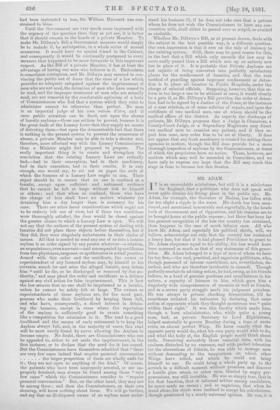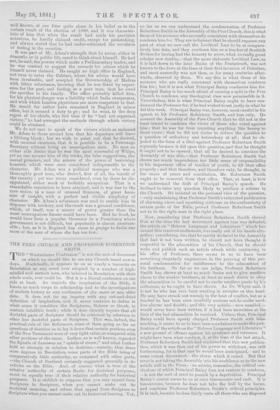MR. ADAM.
TT is an unavoidable misfortune, but still it is a misfortune
for England, that a politician who does not speak well never quite obtains his fitting place in the public eye. Mr. Adam, for example, the Governor of Madras, has fallen with far too slight a ripple in the water. His death has been men-
tioned, the aea-s Honed, and mentioned honourably and regretfull 1:1, I rl both of Government and of Opposition, and his remains are to be brought home at the public expense ; but there has been far less general recognition of the loss the country has sustained, than happens in the case of much inferior men. All who knew Mr. Adam, and especially his political chiefs, will, we believe, acknowledge not only that the country has sustained a heavy loss, but that if it had pleased Providence to grant to Mr. Adam eloquence equal to his ability, the loss would have been mourned as much as that of any statesman of this gener- ation. Mr. Adam belonged to a type of men of whom we have far too few,—the cool, practical, and sagacious politicians, who, though possessed of intense convictions, are, nevertheless, de- tached, and who are therefore invaluable in council. Though perfectly resolute in advising action, he had, owing, as his friends believe, to a fund of genuine goodness and unselfishness in his nature, a capacity of fairness in him which gave him a singularly wide comprehension of enemies as well as friends, and in a severe party struggle made his judgment priceless. He was always in private checking denunciation, till he sometimes irritated his intimates by declaring that some action of opponents which they thought monstrous was " quite within their right." It was this faculty which made him, though a born administrator, who, while quite a young man, had, as private Secretary to Lord Elphinstone, helped materially to govern Bombay during a time of acute crisis, an almost perfect Whip. He knew exactly what the opposite party would do, what his own party would wish to do, and what the body of, the English people would think about both. Perceiving accurately those essential data, with his coolness disturbed by no ranoours, and with perfect toleration for the aberrations of friends, he was able to manage men without descending to the temptations on which other Whips have relied, and which he could not bring himself to use. He could bring a whole party up to the scratch in a difficult moment without promises, and discover a hostile plan which to other eyes, blinded by angry pre- possessions, was still invisible. He was so simply true, that in his first function, that of informal arbiter among candidates, he never made an enemy ; and so sagacious, that when ho stood alone, his chiefs were inclined to accept his calculations, though questioned by a nearly universal opinion. He was, it is
well known, at one time quite alone in his belief as to the certain result of the election of 1880, and it was character- istic of him that when the result had made his prevision notorious, he hardly claimed credit, except for painstaking, and always stated that he had under-estimated the revulsion of feeling in the counties. It was part of Mr. Adam's strength that be never, either in domestic or in public life, cared to think about himself. He had not, he said, the powers which make a Parliamentary leader, and he was content to suggest the rewards for others which he himself never claimed. He sought no high office in England, not even to enter the Cabinet, where his advice would have been invaluable, and accepted the Governorship of Madras with bitter reluctance, knowing that he was fitted by experi- ence for the post, and feeling, as a poor man, that he owed the sacrifice to his family. The office probably killed him, for his physical danger was a liability which India exasperates, and with which London physicians are more competent to deal. He would far rather have remained in England in minor office, but it seemed a duty to go ; and he went, to the deep regret of his chiefs, who feel that if he " had not organised victory," he had arranged the methods through which victory could be obtained.
We do not care to speak of the virtues which so endeared Mr. Adam to those around him that his departure will leave a lifelong blank ; but we wish to point out that he showed, with unusual clearness, that it is possible to be a Patronage Secretary without being an unscrupulous man. No man on either side denies that he was the most successful of Whips, yet no one accuses him of the tricks, the false suggestions, the unreal promises, and the misuse of the power of bestowing honours, which were once considered indispensable to the character. Mr. Adam was a political manager who was a thoroughly good man, who desired, first of all, the benefit of the country ; yet was never considered, even by those he dis- appointed, either weak or foolishly scrupulous. That is a remarkable reputation to have attained, and it was due to the rare union, in a man of unusual firmness, of great keen- ness of insight, with a perfect and visible simplicity of character. Mr. Adam's astuteness was used to enable him to dispense with trickery, and the result was a general confidence, which, of itself, was a source of power greater than the most unscrupulous finesse could have been, Had he lived, he would have been a popular Governor in a Presidency where government is not difficult, but popularity is almost unattain- able ; but, as it is, England has cause to grudge to India one more of the men of whom she has too few.



































 Previous page
Previous page